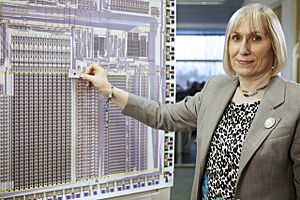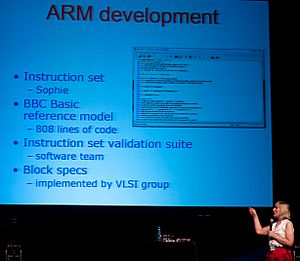Sophie Wilson facts for kids
Quick facts for kids
Sophie Wilson
|
|
|---|---|

Wilson in 2013
|
|
| Born | June 1957 (age 68) Leeds, England
|
| Education | |
| Known for |
|
| Awards |
|
| Scientific career | |
| Institutions |
|
Sophie Mary Wilson (born June 1957) is a brilliant English computer scientist. She helped create the special instructions for the ARM architecture, which is a type of computer processor.
Sophie Wilson first designed a small computer while she was on a break from her studies. Later, she joined a company called Acorn Computers. There, she played a key role in making the BBC Microcomputer. This included creating the BBC BASIC programming language. In 1983, she started designing the ARM reduced instruction set computer (RISC). This design went into production two years later. It became very popular in small, hidden computer systems. Today, it is the most used processor design in smartphones. In 2011, she was named one of the "15 Most Important Women in Tech History" by Maximum PC magazine. She received a special honor, becoming a Commander of the Order of the British Empire, in 2019.
Contents
Early Life and Education
Sophie Wilson was born in Leeds, England. Her parents were both schoolteachers. Her father taught English, and her mother taught physics. She grew up in a village called Burn Bridge in North Yorkshire.
After finishing secondary school at Harrogate Grammar School, Sophie went to Selwyn College, Cambridge in 1976. For her first two years, she studied mathematics. In her final year, she switched to computer science. She was also part of the university's Microprocessor society.
Amazing Career in Computing
Before starting university, Sophie Wilson had already designed two electronic systems. She built these for a company called ICI Fibres Research. This was near her home village.
In 1977, during her summer break from university, she designed a small system. It used a MOS Technology 6502 microprocessor. This system was used to control how cows were fed electronically.
Joining Acorn Computers
Sophie's success with the cow-feeder project caught the eye of Hermann Hauser. He was a student at Cambridge at the time. Hauser was impressed and encouraged Sophie to stay in Cambridge. He wanted her to turn her design into a real product.
Around the same time, a small computer kit called the MK14 was launched. Sophie believed she could make something better. Hauser encouraged her to do so, using parts from the MK14.
In December 1978, Hauser and Chris Curry started Cambridge Processor Unit Ltd (CPU). This company designed computer control systems. Sophie designed a device for their first customer. This device helped prevent cigarette lighter sparks from causing problems in gaming machines. Sophie's computer design, along with a cassette interface by Steve Furber, became the Acorn Micro-Computer. This was the first in a long series of computers sold by the company. Sophie started working at Acorn in 1979.
Creating the BBC Micro
Sophie Wilson was a key person in building the first version of a computer. This computer helped Acorn win a big contract with the British Broadcasting Corporation (BBC). The BBC wanted a computer for an important education project.
The BBC planned a TV series to show how computers worked. They needed a standard computer for viewers to use at home. Their first choice, the Newbury Newbrain, couldn't meet their needs. So, the BBC looked for other options.
Acorn offered to show the BBC a prototype of their next computer, called the Acorn Proton. The problem was, this computer didn't actually exist yet! Hermann Hauser cleverly told Sophie Wilson and Steve Furber that the other had agreed to build a prototype in a week.
Taking on the challenge, the Acorn team worked incredibly fast. They designed the system, including the circuit board, in just three days. They even got special fast memory chips directly from Hitachi. By Thursday evening, a prototype was built. It finally started working on Friday morning. Sophie, who had only a few hours of sleep, quickly started putting the operating system onto it. By the time the BBC arrived, the computer could draw a line on a high-resolution screen.
The BBC accepted the Proton, and it became the BBC Micro. Sophie was responsible for developing its operating system and its version of BASIC, called BBC BASIC. This was a huge task, making the computer much more powerful than earlier models. Sophie worked hard to include new features that made programming easier. She even debugged and re-soldered the prototype while watching a royal wedding on a small TV! Sophie and Steve Furber were even backstage during the computer's first TV recordings. This was in case any software needed fixing. She later said it was a special time when people really wanted to learn about computers.
Developing the ARM Processor
In October 1983, Sophie Wilson began designing the instructions for a new type of processor. This was one of the first reduced instruction set computer (RISC) processors. It was called the Acorn RISC Machine (ARM). The first ARM processor, ARM1, was ready on April 26, 1985. It worked perfectly the first time it was turned on. It went into production that same year.
This type of processor became incredibly successful. By 2012, it was used in 95% of all smartphones! Sophie also designed Acorn Replay. This was a video system for Acorn computers. It included special software that helped ARM processors play high-quality videos smoothly.
Sophie was also a director for Eidos plc, a technology and games company. She also worked as a consultant for ARM Ltd when it became a separate company in 1990.

Since Acorn Computers closed down, Sophie Wilson has given a few public talks. She shares stories about the amazing work done there.
Work at Broadcom
Sophie Wilson was the Chief Architect for Broadcom's Firepath processor. This processor had its roots in Acorn Computers. In 2001, she became a research fellow and director at Broadcom.
In 2011, Maximum PC magazine listed her as number 8 in an article. The article was titled "The 15 Most Important Women in Tech History."
Awards and Recognitions
Sophie Wilson has received many important awards for her work.
- In 2009, she was elected as a Fellow of the Royal Academy of Engineering.
- In 2012, the Computer History Museum in California gave her a Fellow Award. This was for her work on the BBC Micro computer and the ARM processor.
- In 2013, she became a Fellow of the Royal Society.
- She received the 2014 Lovie Lifetime Achievement Award for inventing the ARM processor.
- In 2016, she became an honorary fellow of her old college, Selwyn College, Cambridge. She also received the Royal Society Mullard Award with Steve Furber for their work on ARM.
- In 2020, she was honored as a Distinguished Fellow of the British Computer Society.
In 2019, Sophie Wilson was appointed Commander of the Order of the British Empire (CBE). This was for her great contributions to computing.
In 2022, she received the Charles Stark Draper Prize for Engineering. This award was given for inventing, developing, and building RISC chips. She shared this award with David A. Patterson, John L. Hennessy, and Stephen B. Furber.
In 2024, the Sophie Wilson scholarship for Scientific Computing was created. Sophie Wilson helps fund this scholarship. It supports students studying Scientific Computing at the University of Cambridge.
Personal Interests
Sophie Wilson enjoys photography. She is also involved in a local theatre group. She helps with costumes and set pieces. She has also acted in some plays. She even had a small role as a pub landlady in the BBC television drama Micro Men. A younger Sophie Wilson was played by Stefan Butler in that show.
See also
 In Spanish: Sophie Wilson para niños
In Spanish: Sophie Wilson para niños
 | Bayard Rustin |
 | Jeannette Carter |
 | Jeremiah A. Brown |

